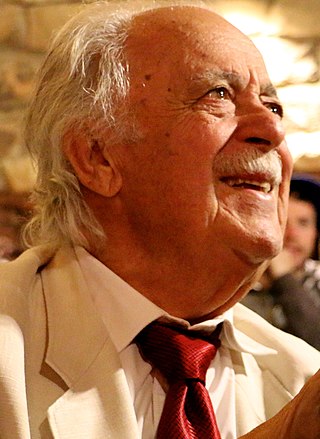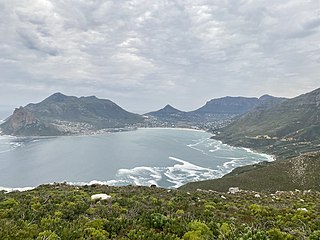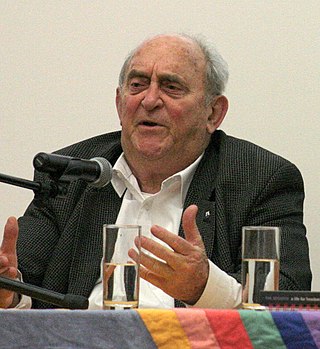
The University of Cape Town (UCT) is a public research university in Cape Town, South Africa. Established in 1829 as the South African College, it was granted full university status in 1918, making it the oldest university in South Africa and the oldest university in Sub-Saharan Africa in continuous operation.

Abraham Louis Fischer was a South African Communist lawyer of Afrikaner descent with partial Anglo-African ancestry from his paternal grandmother, notable for anti-apartheid activism and for the legal defence of anti-apartheid figures, including Nelson Mandela, at the Rivonia Trial. Following the trial, he was himself put on trial accused of furthering communism. He was sentenced to life imprisonment and diagnosed with cancer while in prison. The South African Prisons Act was extended to include his brother's house in Bloemfontein where he died two months later.

George Bizos was a Greek-South African human rights lawyer who campaigned against apartheid in South Africa. He was noted for representing Nelson Mandela during the Rivonia Trial. He instructed Mandela to add the qualification "if needs be" to his trial address, which is credited with sparing him from a sentence of death. Bizos also represented the families of anti-apartheid activists killed by the government, throughout the hearings of the Truth and Reconciliation Commission.

Ahmed Mohamed Kathrada OMSG, sometimes known by the nickname "Kathy", was a South African politician and anti-apartheid activist.

Hout Bay is a seaside suburb of Cape Town in the Western Cape province of South Africa. It is situated in a valley on the Atlantic seaboard of the Cape Peninsula, twenty kilometres south of the Central business district of Cape Town. The name "Hout Bay" can refer to the town, the bay on which it is situated, or the entire valley.

Denis Theodore Goldberg was a South African social campaigner who was active in the struggle against apartheid. He was accused No. 3 in the Rivonia Trial, alongside the better-known Nelson Mandela and Walter Sisulu, where he was also the youngest of the defendants. He was imprisoned for 22 years, along with other key members of the anti-apartheid movement in South Africa. After his release in 1985 he continued to campaign against apartheid from his base in London with his family, until the apartheid system was fully abolished with the 1994 election. He returned to South Africa in 2002 and founded the non-profit Denis Goldberg Legacy Foundation Trust in 2015. He was diagnosed with lung cancer in July 2017, and died in Cape Town on 29 April 2020.

The area known today as Cape Town has no written history before it was first mentioned by Portuguese explorer Bartholomeu Dias in 1488. The German anthropologist Theophilus Hahn recorded that the original name of the area was '||Hui !Gais' – a toponym in the indigenous Khoi language meaning "where clouds gather."
The National Union of South African Students (NUSAS) was an important force for liberalism and later radicalism in South African student anti-apartheid politics. Its mottos included non-racialism and non-sexism.
Willie Bester is a South African painter, sculptor and collage artist. He is best known for his role in the protesting of the apartheid system through his artwork. He currently lives in Kuilsrivier, South Africa with his wife, Evelyn and their three children.
Gavin Jantjes is a South African painter, curator, writer and lecturer.

Green Point is an affluent suburb on the Atlantic Seaboard of Cape Town, South Africa located to the north west of the central business district. It is home to Cape Town Stadium, a major sporting venue that was built for the 2010 FIFA World Cup. Sea Point promenade runs through the suburb, connecting it to Three Anchor Bay and Sea Point, a popular Jewish neighbourhood. Somerset Road forms the main thoroughfare lined by restaurants, cafés, delis, boutiques and nightclubs.
Ari Sitas is a South African sociologist, writer, dramatist and civic activist.

Timothy Peter Jenkin is a South African writer, anti-apartheid activist and former political prisoner. He is best known for his 1979 escape from Pretoria Local Prison, along with Stephen Lee and Alex Moumbaris.
The following is a timeline of the history of Cape Town in the Western Cape province of South Africa.
Shirley Gunn is a South African former anti-apartheid activist and Umkhonto we Sizwe (MK) member who was falsely accused of the Khotso House bombings in 1998.
Jo Noero is a South African architect. Noero is an International Fellow of The Royal Institute of British Architects (RIBA) and an Honorary Fellow of the American Institute of Architects (AIA).

Cameron Muir Dugmore is a South African politician who was elected to the National Assembly of South Africa in the 2024 general election as a member of the African National Congress. Prior to his election, he was the Leader of the Opposition in the Western Cape Provincial Parliament from 2019 until 2024. Dugmore served in the Western Cape Provincial Parliament from 1994 until 2009 and again from 2014 until 2024. He served as the Western Cape Provincial Minister of Cultural Affairs and Sport from 2008 to 2009, and as the Western Cape Provincial Minister of Education from 2004 to 2008.

The following outline is provided as an overview of and topical guide to Cape Town:

Escape from Pretoria is a 2020 Australian prison film co-written and directed by Francis Annan, based on the real-life prison escape by three political prisoners in South Africa in 1979, starring Daniel Radcliffe and Daniel Webber. It is based on the 2003 book Inside Out: Escape from Pretoria Prison by Tim Jenkin, one of the escapees.
















